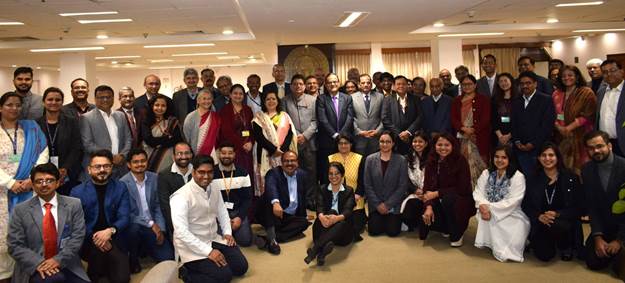Office of Principal Scientific Advisor to GoI
24th Meeting of Prime Minister Science, Technology & Innovation Advisory Council (PM-STIAC) discusses regulation of medical products, approval processes, challenges & opportunities in India
Posted On:
06 FEB 2024 6:22PM by PIB Delhi

Principal Scientific Adviser (PSA) to the Government of India, Professor Ajay Kumar Sood convened the 24th Prime Minister Science, Technology & Innovation Advisory Council (PM-STIAC) meeting today (February 6, 2024) at Vigyan Bhawan in New Delhi.
The meeting brought together PM-STIAC members, key government officials, and experts from the medical and health industry to discuss priority areas of the health products ecosystem, particularly the current regulatory processes of medical products, gaps, and challenges faced by stakeholders, and emerging opportunities in the regulatory space. The aim was to provide recommendations for a robust regulatory ecosystem.
The meeting was joined by Scientific Secretary Dr. Parvinder Maini and the Secretaries of all relevant departments including Secretary (Health & Family Welfare) Sh. Apurva Chandra, Director-General Indian Council of Medical Research Dr. Rajiv Bahl, Secretary (Biotechnology) Dr. Rajesh Gokhale, Secretary (Pharmaceuticals) Sh. Arunish Chawla, Secretary (Environment, Forests & Climate Change) Ms. Leena Nandan, Secretary (Science and Technology) Prof. Abhay Karandikar, Director-General Council of Scientific and Industrial Research Dr. N. Kalaiselvi, Secretary (Earth Sciences) Dr. M. Ravichandran, Secretary (Defence Research and Development Organisation) Dr. Samir V Kamat and Chairman (Indian Space Research Organisation) Sh. S. Somanath.
In his opening address, Prof. Ajay Kumar Sood said, “The meeting is aimed at assessing the country’s regulatory system and providing constructive suggestions for improvement as a good regulatory system must balance rigour to ensure safety and quality of medical products that are entering the market and yet be enabling to promote research, development, and innovations so that easy access to healthcare is a reality.”
Delivering his remarks, Dr. V.K. Saraswat, Member S&T, NITI Aayog focussed on the medical device sector and said, “India has brought several reforms by releasing the medical device policy, and now the focus should be on the commercialisation of R&D in this sector.”
Dr V.K. Paul, Member Health, NITI Aayog, in his remarks, said, “This is a very timely discussion and India is ready to have a more responsive and efficient regulatory ecosystem for medical products.”
Industry experts delivered presentations on various themes including:
(i) Approval process of Drugs, its current scenario, and suggested changes which focussed on promoting a stronger innovation ecosystem for manufacturing of drugs and overall enabling regulatory systems that are seamless, robust, and aligned with global practices.
(ii) Vaccine regulation in India, its challenges and opportunities which focussed on simplifying approval processes for vaccine development in India by streamlining various approval processes and reducing dependencies on multiple ministries, agencies, and committees for approvals.
(iii) Diagnostic and medical device ecosystem, its enablers and barriers which deliberated on India’s progress in building a resilient innovation ecosystem for medical devices, its barriers, and proposed solutions.
(iv) Regulatory ecosystem for the animal health products which highlighted the progress made and issues faced by industries producing animal health products.
(v) Regulation of emerging therapies in India and lessons from best practices around the world which discussed India’s potential to become a global leader in Cell and Gene Therapy (CGT) space. Best practices from the global regulatory guidelines may be reviewed to build on the existing policies.
The final presentation was made by Dr. Rajiv Singh Raghuvanshi, Drugs Controller General of India, Central Drugs Standard Control Organisation (CDSCO) on ‘Building a robust and enabling regulatory ecosystem in India’ which highlighted the major issues faced by CDSCO in the regulatory ecosystem, and shed light on its recent efforts to transform regulatory ecosystem in India.
Following the presentations, Secretaries, experts, and distinguished PM-STIAC members gave their inputs on how various ministries and departments of the Government of India can work together to address this important issue.
In his concluding remarks, Prof. Sood said that input from today’s discussion would be taken up to address these issues in a tangible and time-bound manner to create a robust and enabling regulatory ecosystem for medical products in India.
*****
DS/ST
(Release ID: 2003190)
Visitor Counter : 3992